
Water is undoubtedly one of the most fundamental components of our existence, both on this planet and for our health. The chemical substance composes approximately 60% of our entire bodies, and is responsible for ensuring that everything from body temperature to waste regulation operates correctly, says Healthline......Read The Full Article>>.....Read The Full Article>>
And yet, while a lot of us know how important water is to keep us fighting fit, there’s no denying that drinking it all the time can be a bit of a drag. And honestly, it’s pretty easy to forget, no matter how many fancy water bottles your partner has bought you for Christmas in the past. Maybe that’s why almost 80% of Americans claim that they don’t drink enough water daily, according to a survey conducted by Quench (per PR Newswire). While a large proportion of these folks simply attribute it to not being thirsty, it’s important to remember that by the time you’re thirsty, you’re probably already dehydrated.
So what happens when you’re not staying on top of your water requirements? We’ve got all the answers you need right here. Grab a glass, and let’s get started.
When you don’t drink enough water, you become dehydrated
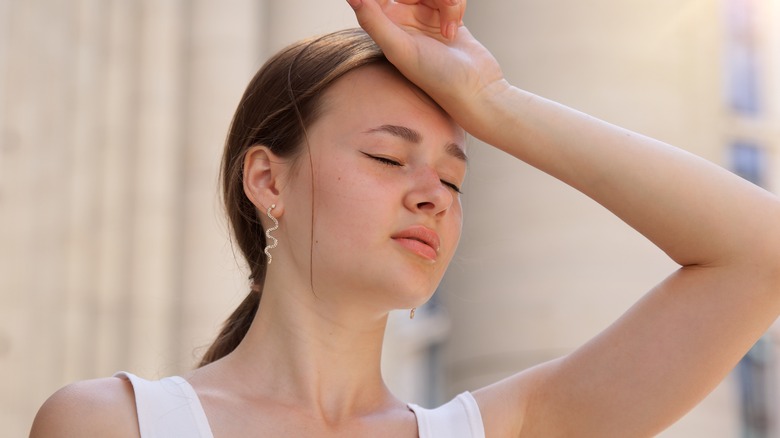
It might seem obvious that not drinking enough water daily results in a lack of hydration, but how does dehydration actually work?
Simply put, our bodies are full of water — inside our blood, muscles, and cells — and this water is constantly exiting our bodies throughout the day, when we pee, sweat, or even just breathe (per Medical News Today). The water we drink then replaces this lost fluid, with high-water foods and other fluids also helping to correct our water balance. However, when we don’t drink water, things start to go wrong. As our systems are reliant on adequate water levels to continue functioning, the slightest imbalance can produce unpleasant consequences, as our bodies try to carry on without the fluid levels they need.
While you might assume that thirst is the main sign of dehydration, it’s easier to judge whether you need to drink more water by the color of your pee. In fact, some folks (particularly older adults) may not get thirsty at all when they’re dehydrated. If you’re dehydrated, your urine will generally be a darker color, whereas clear or pale urine is ideal.
Your digestive system can start to struggle
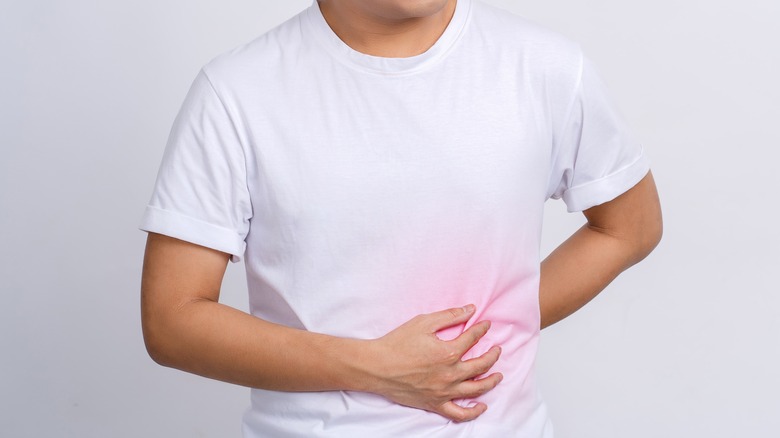
Water and your digestive system are intrinsically linked, and a drop in hydration levels can have a big impact on how capably food can move through your system (per WebMD).
Water not only hydrates your intestines, but it also keeps the fluid levels in your food (and subsequent waste) high enough to travel through your body smoothly. When you don’t drink enough water, your body tries to compensate by drawing more and more water from the food it’s trying to digest. This can dry this food out, meaning that it moves through your intestines more slowly, which leads to constipation.
As such, if you find that you’re constantly constipated, drinking more water throughout the day may ease this somewhat. It’s worth bearing in mind, though, that dehydration is far from the only cause of constipation, which can be prompted by anything from inactivity to pregnancy (per the NHS). Also, remember that not all fluids will help you out on the constipation front. Drinking alcohol, for example, may have a counterproductive effect, as it can increase dehydration and make it even harder to pass stools easily.
Your brain shrinks when you’re dehydrated
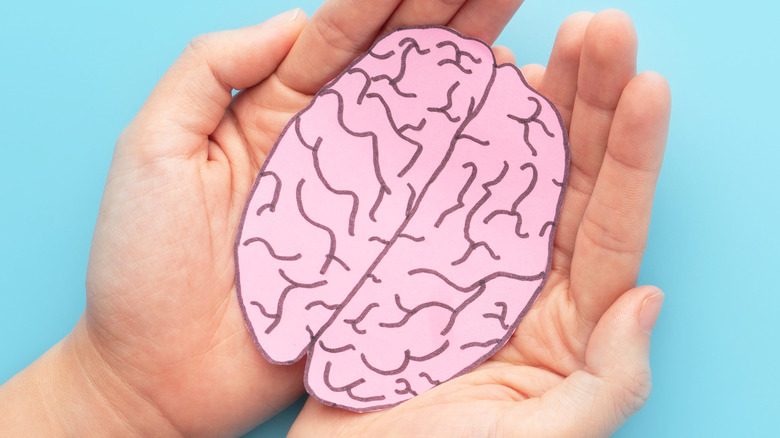
Do you know that pounding headache that rudely wakes you up after a night on the town? That’s largely due to dehydration, folks.
When you don’t drink enough water, the tissues in your body start to get smaller as they lose moisture, as the Cleveland Clinic explains. This includes your brain tissue, and when this happens, it starts to compress the insides of your head, including your nerves, creating that painful sensation. When you drink alcohol (which is a diuretic), you lose fluid even faster, leading to the classic “hangover headache” (per Healthline) — but even just forgetting to drink water for a little while can create that aching sensation.
The good news, though, is that the best way to deal with a dehydration headache is by rehydrating yourself. Introducing fluids back into the body will allow the brain to return to normal, and will hopefully lead to the pain dissipating. Remember not to drink loads of water in one go, though, as this can make you feel nauseous. Instead, try to take little sips of water constantly, to keep your hydration levels topped up and your stomach settled.
Fatigue can start to set in
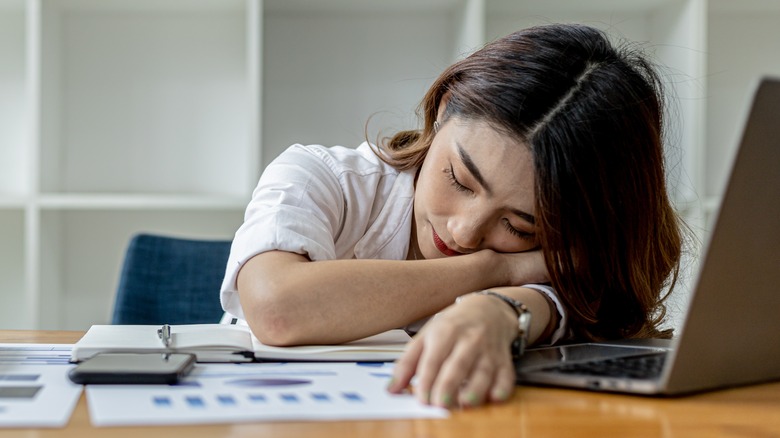
Fatigue can be caused by an enormous amount of things, from vitamin deficiency to hepatitis (per Medical News Today). But sometimes, the reason why we feel tired and weak is right under our noses, inside that water bottle that we haven’t taken a sip out of all day.
Fatigue can occur even when someone is mildly dehydrated, as research published in Nutrition Reviews discusses. This fatigue effect can also be particularly noticeable when individuals are partaking in physical activity or especially hardcore exercise, with dehydration leading to inhibited performance.
The reason for this is blood pressure. When you don’t drink sufficient amounts of water, you essentially have less blood in your system, and this means that your blood pressure is lower, as K Health explains. As your blood pressure decreases, you’ll begin to experience symptoms of fatigue and tiredness. Luckily, though, drinking ample amounts of water can help to keep your blood pressure in a safe, healthy range (via MedicineNet).
Your eyesight may be compromised
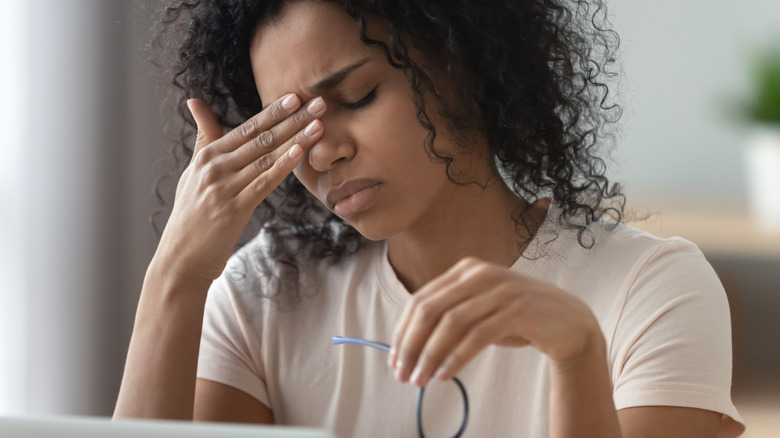
At the root of pretty much all of our bodily functions is water. And this includes eyesight, which is influenced by our hydration levels pretty heavily.
Anyone who’s ever looked at their eyes in detail will attest to the fact that they have moisture in them, especially on the front of the eye (called the “ocular surface,” as Healthline states). But when we don’t drink enough water, the surface can dry out, and our eyes can become irritated, leading to a loss of vision. The eyes may also start to sting or burn, might find it harder to focus, and may also become more sensitive to bright lights.
So, how do we fix dry eyes? By drinking water, of course! Staying hydrated will keep the eyes moist and functioning at their best. It can also be helpful to grab some eye drops from your local pharmacy, which can lubricate the surface of your eye. Prioritizing certain nutrients, like omega-3 fatty acids, will also help. It’s worth bearing in mind that some people are more susceptible to dry eyes than others. Folks who wear contact lenses are especially prone to eye dryness, which means that staying hydrated is even more important (per Optimax).
The body can start to retain water
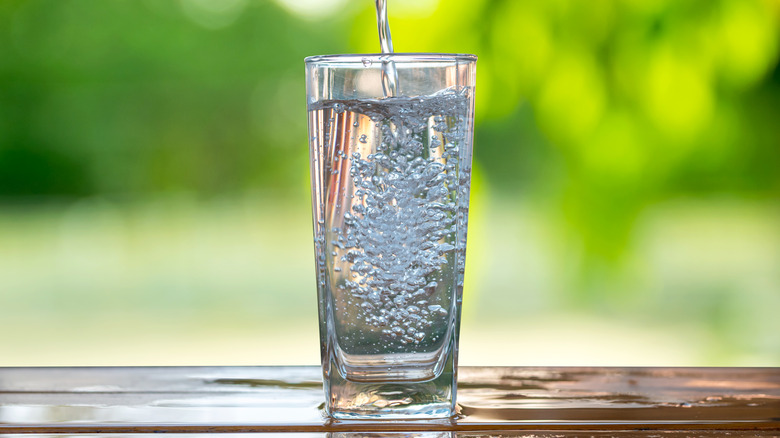
Let’s imagine that you have a bag full of money. The bag rips open, and the money starts falling out. You’re likely going to do anything you can to keep the rest of the money in there, right?
The same concept applies to hydrating our bodies. When the body starts to lose water, its most precious resource, it snaps into action pretty quickly to keep the water that’s left inside of it, to ensure that it continues to function at optimal capacity (per SFGate). This process, known as water retention or edema, can occur (somewhat counterintuitively) at the same time as dehydration, and can make parts of the body swell up, as Everyday Health explains. Edema can also lead to the disruption of the body’s regular functions.
Interestingly, one of the best ways to reduce water retention due to dehydration is to simply drink more water. By doing this, your body can release the water it’s storing, and everything can return to normality, as “Done With Dieting” author Lauren R. Shaw explains (via SFGate).
Your mental health can be impacted
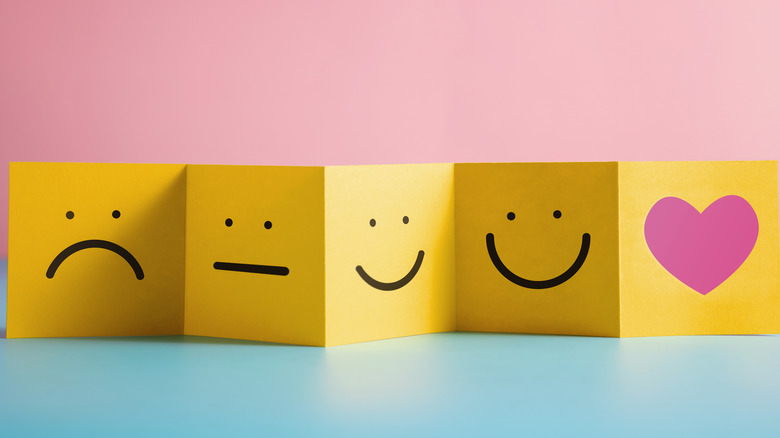
When we think of how mental health conditions occur, dehydration might not be the first cause we jump to. But interestingly, there does appear to be a link between hydration levels and the propensity for mental health issues, according to several scientific studies (via Healthline).
A study published in the World Journal of Psychiatry examined more than 3,000 adults in Iran. Researchers observed that folks who drank more water regularly exhibited a lower likelihood of being depressed or having anxiety, with depression associated with dehydration being particularly notable. Another study published in PLoS One found that people who stayed on top of their water intake generally had better moods overall, and appeared to be calmer than those who didn’t.
It should be noted that across a lot of scientific research, the link between dehydration and mental health conditions was clear, but not especially drastic. Nonetheless, it’s important to ensure that you’re getting adequate hydration wherever possible, and not just for your physical health.
The body sends out more hunger signals
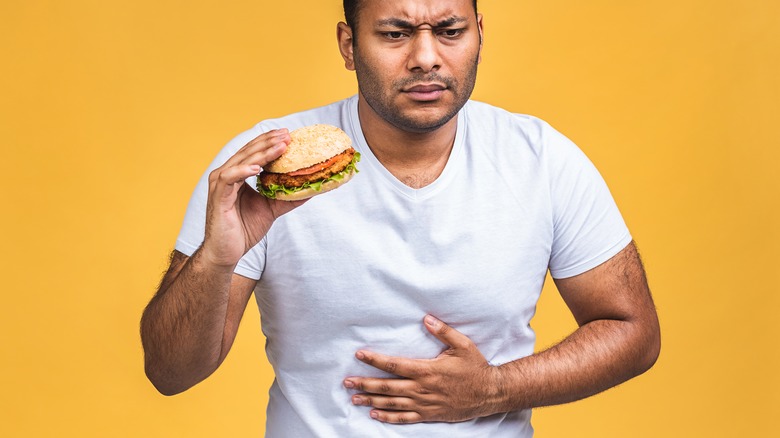
How do we make ourselves less hungry? Usually, it’s by eating something, right? Well, yes, but there is a wide range of things that can also reduce hunger levels (or conversely, cause them to be higher than we might like) — and one of those is not getting enough water.
“Sometimes people mistake thirst for hunger and they eat more, but really they just need to drink more,” explains Henry Ford Health’s family medicine doctor Marjan Moghaddam (via Henry Ford Health). This is because when your body is lower on fluids, your organs don’t function at their best, including your liver, which is responsible for regulating your energy levels, says the Lyndon B. Johnson General Hospital’s chief of cardiology John Higgins (per Everyday Health).
Because your liver is unable to release glycogen as well, hunger signals kick in, and you get that urge to snack. You might notice that these hunger pangs are particularly centered around foods that supply sugar fast, as these will deliver the boost of glucose you’re lacking. Fortunately, though, sometimes all you need is a glass of water to reduce these hunger pangs, says Moghaddam.
Your mouth will dry out
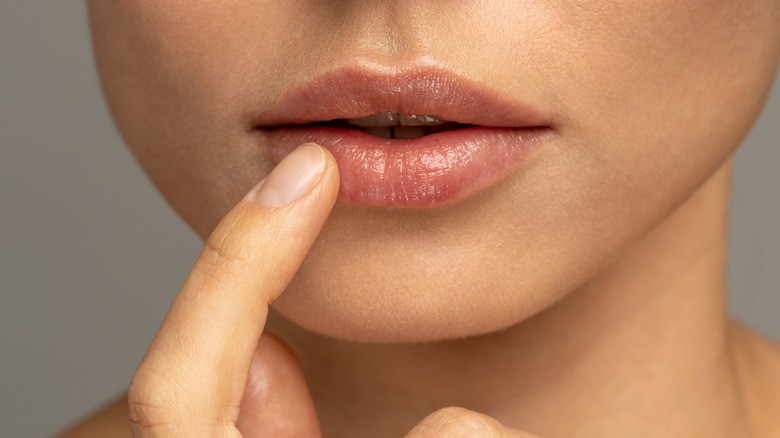
The saliva that’s constantly in our mouths (even though it’s easy to forget it’s there sometimes) is — you guessed it! — largely made of water. And our bodies need adequate amounts of water in them to create the saliva we need, as NHS Inform explains.
But when we don’t drink enough, the body can have a harder time producing saliva, and this can lead to a dry mouth. This can be an issue, as not only is saliva essential for aiding in the digestion process, but having an adequately moist mouth can also bolster dental hygiene and keep mouth infections and sores at bay (per WebMD). Additionally, a dry mouth can lead to bad breath, which we’re pretty sure no one wants.
With that said, while a dry mouth can be created by dehydration, it’s far from the only thing that can cause it. A dry mouth may also be a side effect of medication or a symptom of diabetes, and may even occur due to breathing through the mouth instead of the nose. If you’re concerned about your dry mouth and drinking more water isn’t solving the problem, it’s best to speak to your doctor.
The metabolism starts to slow down
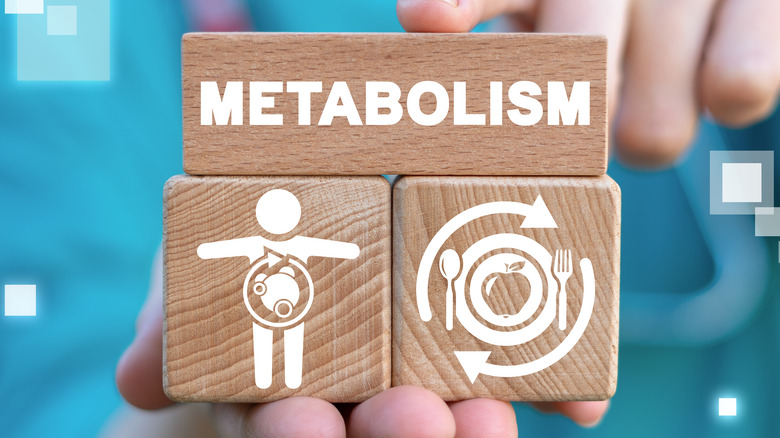
What does the metabolism actually do? While we often associate the word “metabolism” with how quickly people can lose weight, it’s slightly broader than that. Metabolism is essentially the process by which the body turns food into energy, as Harvard Health Publishing explains. This plays into all bodily functions, including moving blood around the body, growing new cells, and even breathing.
But, our metabolism does also have a bearing on how quickly we work through calories, and drinking more water could provide our metabolism with a boost (per Johns Hopkins University). When we drink water, our bodies have to work to warm it up to the body’s internal temperature. This requires energy, which gives our metabolisms a lift. This temporary boost could be as high as 30%, as a study published in the Journal of Clinical and Diagnostic Research shows.
Bear in mind, though, that drinking more water likely won’t create a hugely significant effect on weight loss in and of itself, but hey, we’re willing to bet you won’t regret that extra water you drank.
Skin health can begin to suffer
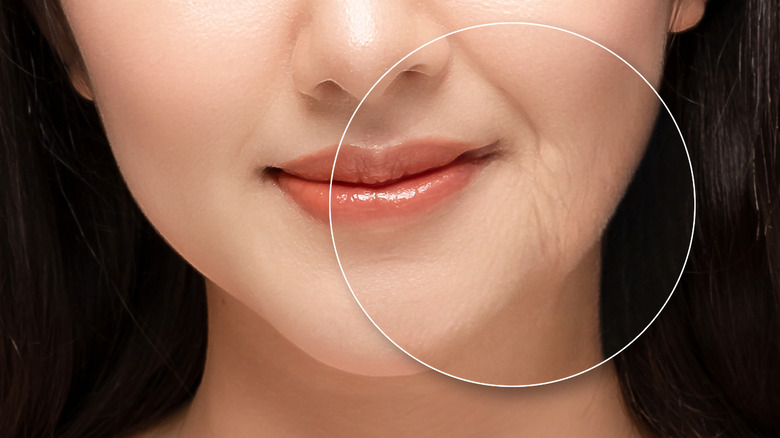
Our skin is hugely affected by the water that we drink, and when we don’t drink enough water, things can start to go south pretty fast.
Human skin is an intricately constructed thing, and lipids and skin cells work to keep moisture inside the upper layer of skin, as WebMD explains. However, “when the water content inside the cells decreases, the cells become shriveled,” states the Mount Sinai Icahn School of Medicine’s assistant professor of dermatology Michael Cameron. The levels of collagen in the skin may also suffer and deteriorate without adequate hydration, (per EatingWell). All of these things lead to, as you might expect, the increased production of wrinkles and faster aging of the skin.
Fortunately, drinking enough water can help to keep the skin from drying out. It’s also important, though, to apply moisture from the outside, not just the inside. Try to use a high-quality moisturizer, and avoid drying out the skin by taking showers or baths that are too long or too hot.
Your cardiovascular system is affected
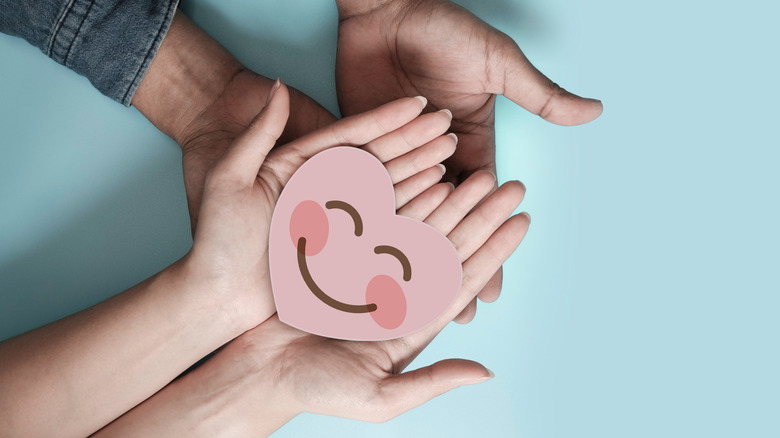
Your heart and your hydration levels are inextricably connected. If your hydration levels drop, your heart can start to operate less optimally, and this can create some issues for your circulatory system, states The Heart House.
Aside from causing heart trouble in the short term, consistent dehydration may also have a long-term effect on your heart health. “Similar to reducing salt intake, drinking enough water and staying hydrated are ways to support our hearts and may help reduce long-term risks for heart disease,” according to National Heart, Lung, and Blood Institute-based researcher Natalia Dmitrieva (via the National Institutes of Health).
Dmitrieva’s claims were corroborated in a study published in the European Heart Journal, which appeared to show that maintaining a consistent level of hydration throughout a person’s lifetime meant that they were less likely to develop cardiovascular disease or experience heart failure. Dehydration has also been associated with stroke, and for people who have already experienced a stroke, dehydration post-discharge from the hospital could worsen their outcome (per research published in BMC Cardiovascular Disorders). All of this spells out the importance of keeping your water intake regular and plentiful.
Cognitive function can be inhibited
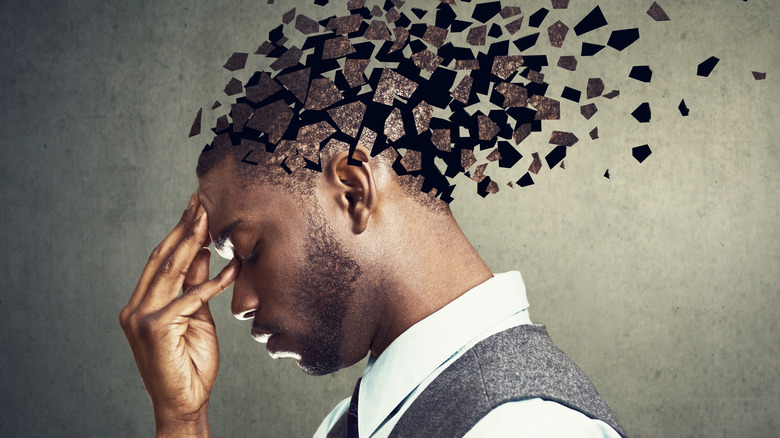
Are you finding it a little difficult to concentrate today? Maybe that spreadsheet you’ve been working on all week is feeling completely impenetrable? Well, you may be dehydrated.
As research published in Nutrients discusses, drinking water might have an effect on your ability to remember things and complete tasks. The paper discussed water intake and concentration specifically concerning children, and states that in four separate studies, when kids drank water, their cognitive function appeared to improve. Manwhile, in one study published in Appetite, kids who were given a 300-milliliter glass of water appeared to have better memory and a greater capacity to maintain attention.
The Nutrients research also discusses the potential effect of dehydration on older adults’ cognitive function, but also warns against simply assuming that drinking water may solve any cognitive issues. The researchers state that doing so may lead to overhydration, diluting the essential salts in your system and potentially leading to headaches and muscle issues (per Healthline).
How much water should you actually be drinking?
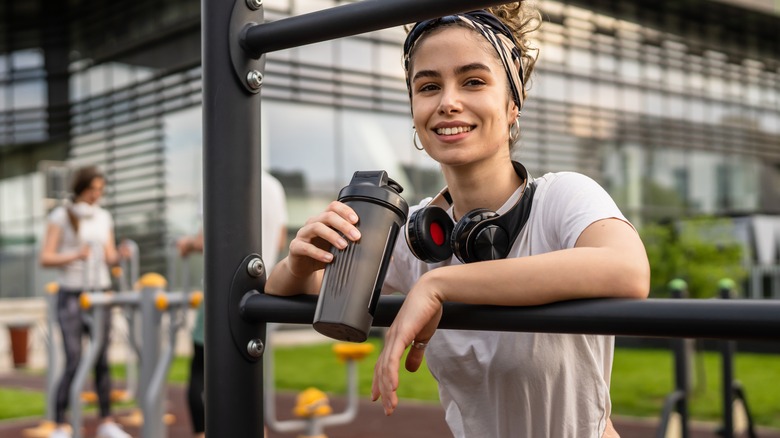
So, you know how important drinking water is. You’ve been told it every day of your entire life. But you’ve also been told that you should drink eight glasses, or six glasses, or ten glasses, or a gallon, or two liters a day to stay hydrated … And admittedly, it’s pretty confusing. So what’s the right amount?
Well, the answer varies depending on person to person. As a rough guideline, it’s advised by the U.S. National Academies of Sciences, Engineering, and Medicine that men try to consume around 3.7 liters (15.5 cups) of water each day, whereas women should aim for 2.7 liters (11.5 cups) daily (per Healthline). But that also covers any other fluids you drink and the water that you get from eating, which is roughly a fifth of your fluid intake daily.
There are also certain factors that affect how much water you should drink. For example, if you’re an especially active person, you’ll need more water than someone who isn’t, as you’re likely sweating more. If you work or live in a particularly hot environment, the same principle applies. And if you eat foods higher in salt or sugar, you might lose water faster (and thus need to drink more). In short, there’s no one-size-fits-all approach when it comes to hydration. The best thing to do, really, is keep an eye on your pee. If it’s clear, you’re good to go.
